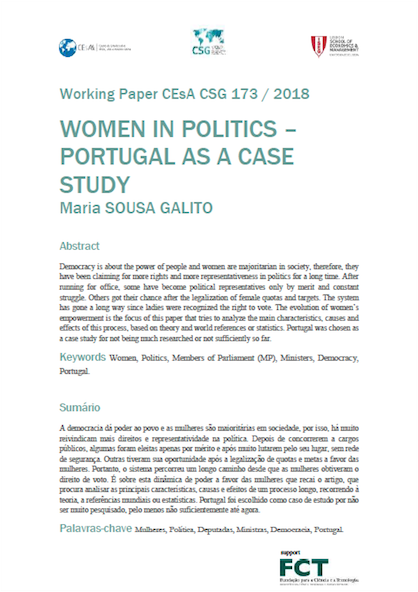Working Paper 173/2018: Women in Politics: Portugal as a case study

Title: Working Paper 173/2018: Women in Politics: Portugal as a case study
Author(s): Galito, Maria Sousa
Publication Date: 2018
Publisher: ISEG – CEsA/ CSG
Quotation: Galito, Maria Sousa (2018). "Women in politics : Portugal as a case study". Instituto Superior de Economia e Gestão – CEsA/ CSG - Documentos de Trabalho nº 173/2018.
Abstract: Democracy is about the power of people and women are majoritarian in society, therefore, they have been claiming for more rights and more representativeness in politics for a long time. After running for office, some have become political representatives only by merit and constant struggle. Others got their chance after the legalization of female quotas and targets. The system has gone a long way since ladies were recognized the right to vote. The evolution of women’s empowerment is the focus of this paper that tries to analyze the main characteristics, causes and effects of this process, based on theory and world references or statistics. Portugal was chosen as a case study for not being much researched or not sufficiently so far.
Identifier: http://hdl.handle.net/10400.5/16437
Category: Working paper
Abstract:
Democracy is about the power of the people. In order to sustain, implies (at least) representativeness of its major groups. When majority rules minorities, lobbies complain when not happy and some of their demands are met; but the system doesn’t turn totally in their favor if it goes against the interests of a larger assembly. When minority rules the majority, problems arise (populism against elite, for instance); and sooner or later there’s a significant shift in society. Quantity gives power. Numbers do count in Democracy. Women are the majority of the population. It was not always so, but nowadays it’s an unquestionable fact. For cultural, institutional or socioeconomic reasons they were submissive for centuries to a system that did not recognize their public activity. They were not involved in decision making and rebel against that. At first, their demands were not met. But waves are changing. As long as democracy prevails and women’s numbers and percentages won’t drop, they’ll probably continue to raise awareness to their cause, increasing their power and influence in society. The evolution of women’s empowerment is the focus of Women in Politics: Portugal as a case study, that tries to analyze the main characteristics, causes and effects of this process, based on theory and world references or statistics. Portugal was chosen as a case study for not being much researched or not sufficiently so far.
Quotation:
Galito, Maria Sousa (2018). “Women in politics : Portugal as a case study”. Instituto Superior de Economia e Gestão – CEsA/ CSG – Documentos de Trabalho nº 173/2018.





